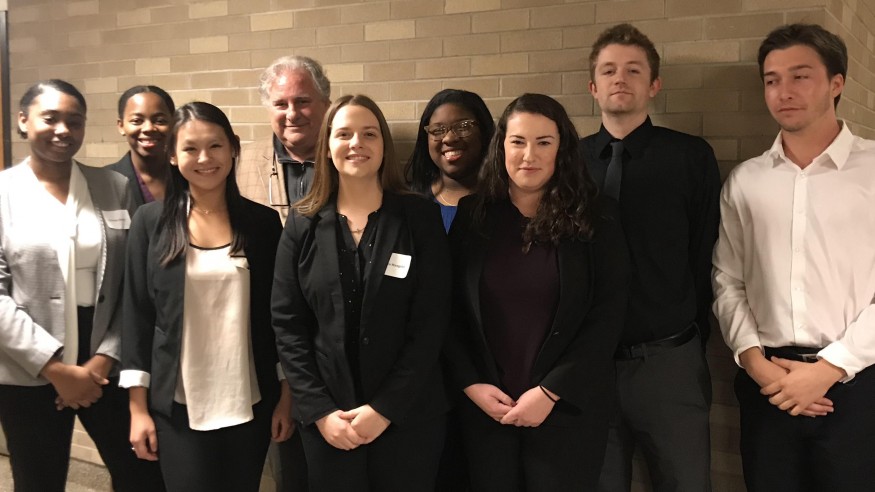
Moot Court 2018
Eight Teams Represent Ohio Wesleyan in Regional Competition, Three Students Earn Recognition
Five of eight Ohio Wesleyan University moot court teams advanced to the final day of regional competition, and three students earned individual recognition for their skills in arguing Constitutional issues before panels of judges and lawyers.
A total of 16 students participated in this fall's moot court program, said politics and government professor and pre-law advisor Michael Esler, Ph.D., who coaches the team. The students participated recently in two regional competitions: the Nov. 16-17 Midwest Regional in Wooster, Ohio, and the Nov. 30-Dec. 1 Great Lakes Regional in Saginaw, Michigan.
"This year's group was the youngest in OWU history," Esler said. "Only four were seniors and only three had previously competed in moot court.
"They were enthusiastic and put in the work, but I did not have a good sense of how well they would do," he said. "It turns out that they performed at a high level in two of the strongest regionals in the country.
"Five of eight of our teams advanced to the final day of competition, which is remarkable," Esler continued. "The quality of the competition and growth of participating teams have increased in recent years, making it more difficult to advance. The good news is that we will have a strong and experienced group returning next year."

In the Midwest Regional, the team of seniors Ana Borish and Matt Houck advanced from the preliminary rounds to the final eight and finished seventh overall out of 30 teams. (The top five teams automatically received bids to the national championships in Florida in January.) Borish and Houck each earned individual orator honors by finishing, respectively, 18th and 19th out of 60 competitors.
"In previous years," Esler said, commenting on the caliber of the competition, "the Borish-Houck team would have received a bid to the national competition."
Also at the Midwest Regional, the team of junior Anne Miner and senior Nicholas Melvin advanced to the sweet 16 round. Miner earned a top 20 individual award by placing 17th among all orators. Melvin placed 22nd in individual rankings.
The teams of juniors Lauren Mangold and Daniela Black and junior Keionna Badie and sophomore Alexis Thomas also competed, earning solid scores, but fell just short of advancing to the round of 16, Esler said.
In the Great Lakes Regional, the teams of senior Holley Hickman and freshman Chase D., sophomore Paige Ross and junior Austin Moore, and sophomores Alana Guzman and Amber Khan advanced to the round of 24 out of 48 teams. The team of junior Carrie Kubicki and sophomore Zach Schwartz also competed at a high level, but fell short of advancing to the second day of competition, he said.
Both regional contests are part of the American Collegiate Moot Court Association's annual moot court competition, involving over 300 teams from colleges and universities across the United States.
For the competition, schools form two-person teams who argue two constitutional issues before panels of attorneys and judges. This year's issues involved the constitutionality of a college's affirmative action policy and the free speech rights of college professors.
To learn more about Ohio Wesleyan's moot court program, contact Esler at mvesler@owu.edu, or visit www.owu.edu/politics to learn more about the university's pre-law major.
Founded in 1842, Ohio Wesleyan University is one of the nation's premier liberal arts universities. Located in Delaware, Ohio, the private university offers more than 90 undergraduate majors and competes in 25 NCAA Division III varsity sports. Through Ohio Wesleyan's signature OWU Connection program, students integrate knowledge across disciplines, build a diverse and global perspective, and apply their knowledge in real-world settings. Ohio Wesleyan is featured in the book "Colleges That Change Lives" and included in the U.S. News & World Report and Princeton Review "best colleges" lists. Learn more at www.owu.edu.
